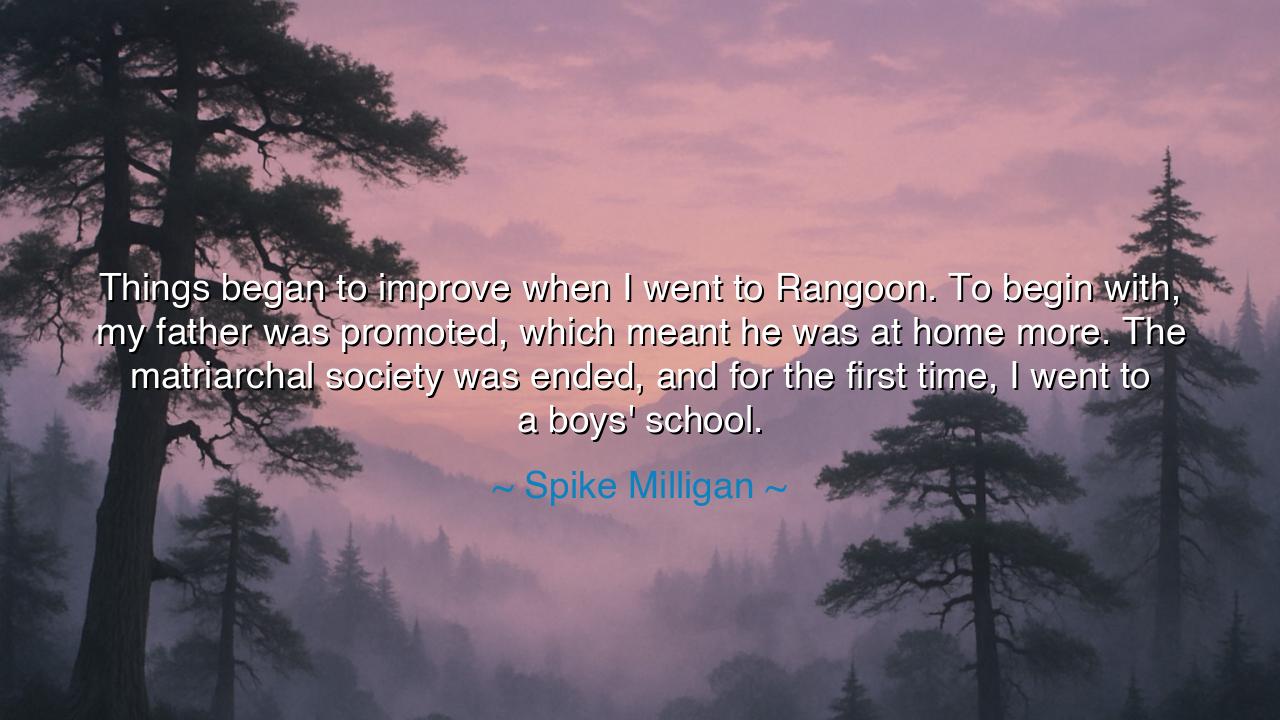
Things began to improve when I went to Rangoon. To begin with, my
Things began to improve when I went to Rangoon. To begin with, my father was promoted, which meant he was at home more. The matriarchal society was ended, and for the first time, I went to a boys' school.






"Things began to improve when I went to Rangoon. To begin with, my father was promoted, which meant he was at home more. The matriarchal society was ended, and for the first time, I went to a boys' school." These words from Spike Milligan speak to the profound changes that occur in the life of an individual when the balance of power shifts, both within a family and within a society. In Milligan’s recollection, the moment of change marked a turning point in his life, one that led to improvements, not just in his immediate circumstances, but in his understanding of identity, gender, and role within society. For Milligan, the move to Rangoon and the promotion of his father signified a shift—a moment when tradition and patriarchy began to reshape his world, and he began to experience life in a new way.
In the ancient world, the power dynamics within families and societies were often rigid, rooted in the patriarchy and matriarchy of their respective cultures. Consider the Greek city-states, where the roles of men and women were sharply divided. In Athens, the father was the head of the household, wielding significant authority not just within the family, but within society itself. Yet, the concept of the matriarchal society—where women had significant power within the family structure—was also present in other parts of the ancient world. In Sparta, for example, women had more freedom and influence compared to their Athenian counterparts. They could own property, participate in public life, and were seen as integral to the society's strength. Yet even in Sparta, the father’s role was dominant in many respects, and the presence of strong patriarchal figures shaped the lives of the citizens.
In Milligan’s case, the end of the matriarchal society he had known and the promotion of his father represented the beginning of a new chapter in his life. For the first time, he was experiencing the dominance of patriarchal order, which brought with it a change in his social world. He went from a place where the influence of women and the matriarchal structure was most prominent to a setting where the father's authority took center stage. This shift was not just personal—it mirrored a broader shift in societal structures. Patriarchy, which had long been the dominant order in many cultures, began to assert its role in shaping identities and gender roles, and this was something Milligan felt acutely as he entered a boys' school for the first time.
The change Milligan experienced in Rangoon can be likened to the journey of Odysseus, who went through many trials and transformations, both personal and societal. In Homer’s Iliad and Odyssey, the hero’s journey was not just one of external adventure but also of inner transformation, as he faced challenges that reshaped his understanding of home, family, and society. For Milligan, the move to Rangoon, and the profound shift in his family’s dynamics, was a kind of rite of passage, a movement from one phase of his life into another, where gender roles, societal expectations, and personal identity were redefined.
The importance of identity and social structure is not just a theme of the ancient world, but one that continues to resonate today. Milligan’s experience in Rangoon speaks to the power of family dynamics and societal norms in shaping a person’s life. As a child, the presence or absence of a father, the authority he holds, and the structure of the household all play significant roles in shaping a young mind. In many ways, Milligan’s words reflect the larger theme of identity formation: how a child’s sense of self is shaped by the external world and the changing dynamics of the environment they grow up in.
The lesson to take from Milligan’s words is one of awareness and adaptability to the shifts that take place in our lives, whether in our family structures or in the society at large. Just as Milligan’s own journey marked a shift from one set of rules and influences to another, we, too, must be willing to recognize when our circumstances change—and to find a way to thrive within them. Growth often comes when we are forced to adapt to new systems, when we are no longer confined by the limitations of the past but instead are given an opportunity to redefine our own path.
So, let us embrace the lessons that change brings, recognizing that even the most difficult transitions—the shifts in authority, in family, or in the larger structure of society—can offer us new possibilities for growth. We must be willing to challenge the systems that restrict us, even as we learn to navigate and understand them. In doing so, we can find our place in the world, just as Milligan did in Rangoon, and continue to grow into the fullest versions of ourselves, shaped not by the constraints of the past, but by the possibilities of the future.






AAdministratorAdministrator
Welcome, honored guests. Please leave a comment, we will respond soon